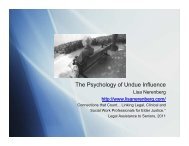Undue Influence: Definitions and Applications - California Courts ...
Undue Influence: Definitions and Applications - California Courts ...
Undue Influence: Definitions and Applications - California Courts ...
Create successful ePaper yourself
Turn your PDF publications into a flip-book with our unique Google optimized e-Paper software.
they may hold in trust the intimate, wounded, vulnerable, or undeveloped parts of those they<br />
serve. Clients suffering from psychological or spiritual injuries are considered to be particularly<br />
vulnerable. Under these circumstances, patients <strong>and</strong> clients may develop emotional <strong>and</strong><br />
psychological dependencies on professionals. The nature of these relationships creates power<br />
disparities in which the professionals hold high levels of power over those they serve.<br />
Recognition of these power disparities have led to strong ethical, moral, <strong>and</strong> legal strictures<br />
against accepting gifts or become sexually involved with clients or patients.<br />
Attention to abuses of power by professionals have tended to focus on sexual contact <strong>and</strong>,<br />
in particular, abuse by male professionals toward female clients. Because professional have the<br />
greater power in these settings, sexual behavior is always prohibited regardless of who initiates it<br />
or how willing clients appear to be. Because the dynamics of these situations are believed to<br />
render victims unable to withhold consent, professionals have the responsibility to maintain the<br />
boundaries (Rutter, 1991).<br />
Summary of the Psychology of <strong>Undue</strong> <strong>Influence</strong> <strong>and</strong> Its Implications for Elder Abuse<br />
The psychological studies described in this section provide rich insights into seemingly<br />
paradoxical behavior. They have further identified factors that heighten vulnerability to unfair<br />
persuasion <strong>and</strong> specific techniques or technologies used by controllers. They further suggest why<br />
certain methods are successful with some subjects <strong>and</strong> not others, <strong>and</strong> suggest ways to prevent<br />
manipulation. As new patterns of unfair persuasion are identified, researchers <strong>and</strong> practitioners<br />
have attempted to determine if <strong>and</strong> when past explanations apply.<br />
Although the settings <strong>and</strong> circumstance in which unfair persuasion has been identified are<br />
far ranging, the tactics associated with them share many common elements. Tactics used to break<br />
down victims’ resistance to persuasion that have been identified in multiple settings include<br />
isolation, degradation, <strong>and</strong> the deprivation of food <strong>and</strong> information. Further, researchers have<br />
attempted to pinpoint techniques, circumstances, or conditions that must be present to achieve<br />
control in various settings. For example, in attempting to explain why some prisoners of war<br />
switched loyalties or turned on fellow prisoners while others did not, researchers have attempted<br />
to determine if it was the length of confinement, the infliction of pain, or other specific strategies<br />
that were applied that ensured the desired results. Similarly, because the majority of hostages do<br />
87




